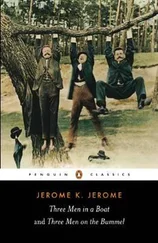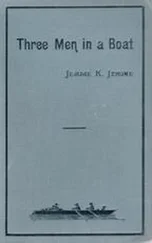Jerome Jerome - Three Men in a Boat (To Say Nothing of the Dog)
Здесь есть возможность читать онлайн «Jerome Jerome - Three Men in a Boat (To Say Nothing of the Dog)» — ознакомительный отрывок электронной книги совершенно бесплатно, а после прочтения отрывка купить полную версию. В некоторых случаях можно слушать аудио, скачать через торрент в формате fb2 и присутствует краткое содержание. Жанр: Юмористическая проза, Классическая проза, на английском языке. Описание произведения, (предисловие) а так же отзывы посетителей доступны на портале библиотеки ЛибКат.
- Название:Three Men in a Boat (To Say Nothing of the Dog)
- Автор:
- Жанр:
- Год:неизвестен
- ISBN:нет данных
- Рейтинг книги:3 / 5. Голосов: 1
-
Избранное:Добавить в избранное
- Отзывы:
-
Ваша оценка:
- 60
- 1
- 2
- 3
- 4
- 5
Three Men in a Boat (To Say Nothing of the Dog): краткое содержание, описание и аннотация
Предлагаем к чтению аннотацию, описание, краткое содержание или предисловие (зависит от того, что написал сам автор книги «Three Men in a Boat (To Say Nothing of the Dog)»). Если вы не нашли необходимую информацию о книге — напишите в комментариях, мы постараемся отыскать её.
Three Men in a Boat (To Say Nothing of the Dog) — читать онлайн ознакомительный отрывок
Ниже представлен текст книги, разбитый по страницам. Система сохранения места последней прочитанной страницы, позволяет с удобством читать онлайн бесплатно книгу «Three Men in a Boat (To Say Nothing of the Dog)», без необходимости каждый раз заново искать на чём Вы остановились. Поставьте закладку, и сможете в любой момент перейти на страницу, на которой закончили чтение.
Интервал:
Закладка:
We went through Maidenhead quickly, and then eased up, and took leisurely that grand reach beyond Boulter's and Cookham locks. Clieveden Woods still wore their dainty dress of spring, and rose up, from the water's edge, in one long harmony of blended shades of fairy green. In its unbroken loveliness this is, perhaps, the sweetest stretch of all the river, and lingeringly we slowly drew our little boat away from its deep peace.
We pulled up in the backwater, just below Cookham, and had tea; and, when we were through the lock, it was evening. A stiffish breeze had sprung up-in our favour, for a wonder; for, as a rule on the river, the wind is always dead against you whatever way you go. It is against you in the morning, when you start for a day's trip, and you pull a long distance, thinking how easy it will be to come back with the sail. Then, after tea, the wind veers round, and you have to pull hard in its teeth all the way home.
When you forget to take the sail at all, then the wind is consistently in your favour both ways. But there! this world is only a probation, and man was born to trouble as the sparks fly upward.
This evening, however, they had evidently made a mistake, and had put the wind round at our back instead of in our face. We kept very quiet about it, and got the sail up quickly before they found it out, and then we spread ourselves about the boat in thoughtful attitudes, and the sail bellied out, and strained, and grumbled at the mast, and the boat flew.
I steered.
There is no more thrilling sensation I know of than sailing. It comes as near to flying as man has got to yet-except in dreams. The wings of the rushing wind seem to be bearing you onward, you know not where. You are no longer the slow, plodding, puny thing of clay, creeping tortuously upon the ground; you are a part of Nature! Your heart is throbbing against hers! Her glorious arms are round you, raising you up against her heart! Your spirit is at one with hers; your limbs grow light! The voices of the air are singing to you. The earth seems far away and little; and the clouds, so close above your head, are brothers, and you stretch your arms to them.
We had the river to ourselves, except that, far in the distance, we could see a fishing-punt, moored in mid-stream, on which three fishermen sat; and we skimmed over the water, and passed the wooded banks, and no one spoke.
I was steering.
As we drew nearer, we could see that the three men fishing seemed old and solemn-looking men. They sat on three chairs in the punt, and watched intently their lines. And the red sunset threw a mystic light upon the waters, and tinged with fire the towering woods, and made a golden glory of the piled-up clouds. It was an hour of deep enchantment, of ecstatic hope and longing. The little sail stood out against the purple sky, the gloaming lay around us, wrapping the world in rainbow shadows; and, behind us, crept the night.
We seemed like knights of some old legend, sailing across some mystic lake into the unknown realm of twilight, unto the great land of the sunset.
We did not go into the realm of twilight; we went slap into that punt, where those three old men were fishing. We did not know what had happened at first, because the sail shut out the view, but from the nature of the language that rose up upon the evening air, we gathered that we had come into the neighbourhood of human beings, and that they were vexed and discontented.
Harris let the sail down, and then we saw what had happened. We had knocked those three old gentlemen off their chairs into a general heap at the bottom of the boat, and they were now slowly and painfully sorting themselves out from each other, and picking fish off themselves; and as they worked, they cursed us-not with a common cursory curse, but with long, carefully-thought-out, comprehensive curses, that embraced the whole of our career, and went away into the distant future, and included all our relations, and covered everything connected with us-good, substantial curses.
Harris told them they ought to be grateful for a little excitement, sitting there fishing all day, and he also said that he was shocked and grieved to hear men their age give way to temper so.
But it did not do any good.
George said he would steer, after that. He said a mind like mine ought not to be expected to give itself away in steering boats-better let a mere commonplace human being see after that boat, before we jolly well all got drowned; and he took the lines, and brought us up to Marlow.
And at Marlow we left the boat by the bridge, and went and put up for the night at the "Crown."
CHAPTER XIII
Marlow. - Bisham Abbey. - The Medmenham Monks. - Montmorency thinks he will murder an old tom cat. - But eventually decides that he will let it live. - Shameful conduct of a fox terrier at the Civil Service stores. - Our departure from Marlow. - An imposing procession. - The steam launch, useful receipts for annoying and hindering it. - We decline to drink the river. - A peaceful dog. - Strange disappearance of Harris and a pie.
MARLOW is one of the pleasantest river centres I know of. It is a bustling, lively little town; not very picturesque on the whole, it is true, but there are many quaint nooks and corners to be found in it, nevertheless - standing arches in the shattered bridge of Time, over which our fancy travels back to the days when Marlow Manor owned Saxon Algar for its lord, ere conquering William seized it to give to Queen Matilda, ere it passed to the Earls of Warwick or to worldly-wise Lord Paget, the councillor of four successive sovereigns.
There is lovely country round about it, too, if, after boating, you are fond of a walk, while the river itself is at its best here. Down to Cookham, past the Quarry Woods and the meadows, is a lovely reach. Dear old Quarry Woods! with your narrow, climbing paths, and little winding glades, how scented to this hour you seem with memories of sunny summer days! How haunted are your shadowy vistas with the ghosts of laughing faces! how from your whispering leaves there softly fall the voices of long ago!
From Marlow up to Sonning is even fairer yet. Grand old Bisham Abbey, whose stone walls have rung to the shouts of the Knights Templars, and which, at one time, was the home of Anne of Cleves and at another of Queen Elizabeth, is passed on the right bank just half a mile above Marlow Bridge. Bisham Abbey is rich in melodramatic properties. It contains a tapestry bed-chamber, and a secret room hid high up in the thick walls. The ghost of the Lady Holy, who beat her little boy to death, still walks there at night, trying to wash its ghostly hands clean in a ghostly basin.
Warwick, the king-maker, rests there, careless now about such trivial things as earthly kings and earthly kingdoms; and Salisbury, who did good service at Poitiers. Just before you come to the abbey, and right on the river's bank, is Bisham Church, and, perhaps, if any tombs are worth inspecting, they are the tombs and monuments in Bisham Church. It was while floating in his boat under the Bisham beeches that Shelley, who was then living at Marlow (you can see his house now, in West street), composed THE REVOLT OF ISLAM.
By Hurley Weir, a little higher up, I have often thought that I could stay a month without having sufficient time to drink in all the beauty of the scene. The village of Hurley, five minutes' walk from the lock, is as old a little spot as there is on the river, dating, as it does, to quote the quaint phraseology of those dim days, "from the times of King Sebert and King Offa." Just past the weir (going up) is Danes' Field, where the invading Danes once encamped, during their march to Gloucestershire; and a little further still, nestling by a sweet corner of the stream, is what is left of Medmenham Abbey.
Читать дальшеИнтервал:
Закладка:
Похожие книги на «Three Men in a Boat (To Say Nothing of the Dog)»
Представляем Вашему вниманию похожие книги на «Three Men in a Boat (To Say Nothing of the Dog)» списком для выбора. Мы отобрали схожую по названию и смыслу литературу в надежде предоставить читателям больше вариантов отыскать новые, интересные, ещё непрочитанные произведения.
Обсуждение, отзывы о книге «Three Men in a Boat (To Say Nothing of the Dog)» и просто собственные мнения читателей. Оставьте ваши комментарии, напишите, что Вы думаете о произведении, его смысле или главных героях. Укажите что конкретно понравилось, а что нет, и почему Вы так считаете.












![Helen Rowland - The Widow [To Say Nothing of the Man]](/books/752764/helen-rowland-the-widow-to-say-nothing-of-the-man-thumb.webp)